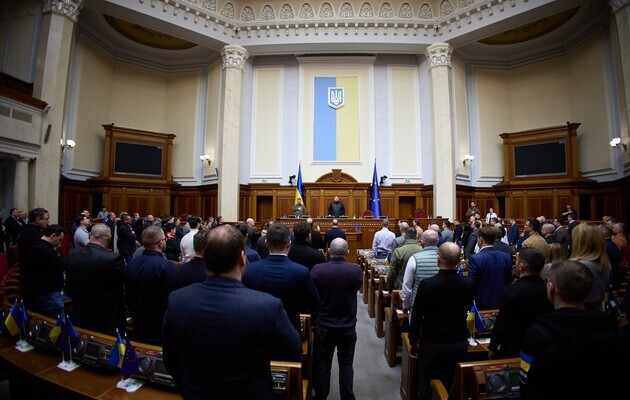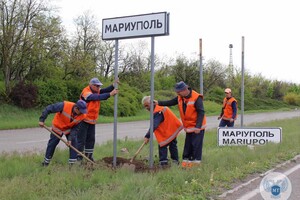Dependency statistics. How effectively the government cooperates with parliament during wartime

The ability of the branches of government during war to act as a coordinated mechanism largely determines how resistant the state is to the challenges and threats it faces. In addition to the strengthening of the president's powers during the period of martial law, which is often justified by the need to quickly make important decisions for the country, the effective work of the government and the parliament is also very important.
Last year, the Cabinet of Ministers of Ukraine and the Verkhovna Rada of Ukraine actively worked not only on the country's budget for 2023 and numerous changes to last year's budget. The long epic process included the adoption of draft laws from the so-called European integration package, the denunciation of international agreements, and the adoption of documents related to the war.
We will try to take a close look at the joint work of the executive and legislative branches of government in order to understand how active the government is, whether it interacts with the parliament well, how many government initiatives have become laws, and how the parliament, on its part, controls the activities of the Cabinet of Ministers of Ukraine during the war.
How the government submits draft laws
The only legislative body in Ukraine is the Verkhovna Rada of Ukraine. But not only parliamentarians, but also the President and the Cabinet of Ministers of Ukraine are empowered to initiate consideration of draft laws. There are exceptions to this rule. For example, draft laws on ratification or denunciation of international treaties can be introduced only by the President or the Cabinet of Ministers of Ukraine.
Only the government can submit the State Budget draft for a certain year to the Verkhovna Rada of Ukraine. This key task was successfully dealt with last year: the draft of the main financial document was submitted by the Cabinet of Ministers of Ukraine on September 14, and the deputies finally approved it on November 3.
However, then numerous amendments and objections begin. In many countries, it is the government that is the initiator of most draft laws, as it has the greatest competence for their preparation, and the most important thing that the government has is the need to change the legal norms in order to implement its program.
In Ukraine, as a parliamentary-presidential republic, everything should be similar. But the numbers indicate otherwise. For the period from March 1, 2022 to March 1, 2023, out of 141 draft laws submitted by the Cabinet of Ministers of Ukraine, only 34 became laws. That is, not even every fourth draft law became a law. Among the projects initiated by the government are 20 ratifications or denunciations of agreements, one approval of the program, 9 resolutions on changing the boundaries of territories or renaming settlements, and 111 draft laws, of which 98 are on amendments to existing laws.
If you look at the number of initiatives that became laws during the specified period, the situation will not be better. In total, the Verkhovna Rada of Ukraine adopted 239 laws. Of them, only 34 were initiated by the Cabinet of Ministers of Ukraine. Another 32 were initiated by the president, and the rest were submitted by people's deputies.
The government did not show leadership in initiating the most important laws for the country. In the past year, the most important legislative initiatives for the country were those related to joining the European Union. The parliament considered six such projects. Of these, the Cabinet of Ministers of Ukraine initiated only one, namely changes to the Law on Combating Legalization and Money Laundering. The rest of the draft laws belong to the people's deputies or the president.
It seems that the government is responsible for realizing the European integration aspirations of Ukrainians, but when it comes down to it, the main role is played by other state structures. Although the Cabinet of Ministers of Ukraine, and not the president or the people's deputies, should be the body that takes the initiative in preparing the necessary draft laws.
Bureaucracy that gets in the way of writing laws
So why did such important laws as "On Media" and "On National Minorities (Communities) of Ukraine" be initiated not by the government, which has all the statistics, information and data regarding the existing regulation, but by elected representatives?
This practice is common not only for this convocation of the parliament, but also for previous ones. And the answer to why things turn out this way is very simple, namely the bureaucracy in the Cabinet of Ministers of Ukraine and the reluctance of government officials to take political responsibility. After all, it's easier to be dependent.
If you look at the Regulations of the Cabinet of Ministers of Ukraine, the internal procedure for initiating and submitting draft laws is quite complicated. First of all, in order to start developing a draft law, it must be included in the plan of draft legislation. This five-year plan is being developed by the Ministry of Justice of Ukraine based on the Government Action Program. Obviously, the requirement to be included in these plans makes it difficult to begin work on urgent problems that may require a quick response.
Secondly, all draft laws that were developed in the ministries or the National Bank of Ukraine need to be considered at a meeting of the Cabinet of Ministers of Ukraine. First, the project should be approved by the government committee. And only after that it can be included in the agenda of the meeting of the Cabinet of Ministers of Ukraine.
Thirdly, the Regulations of the Cabinet of Ministers of Ukraine state that when a draft law establishes new or changes existing norms that regulate public relations, such a document is prepared based on the concept. It should include the problem to be solved, the goal and terms of implementation, ways and means of solution, amount of financial, material and technical resources and sources of funding. The concept of the law must be submitted no later than two months before the end of the term established for the development of the law.
Fourthly, the Cabinet of Ministers of Ukraine cannot independently ask the Verkhovna Rada of Ukraine to consider the draft law out of turn. For this, the government should contact the President of Ukraine. This norm is absurd, because the Cabinet of Ministers of Ukraine has an equal right of legislative initiative with the people's deputies and the president. And it is the government, not the president, that is directly responsible for the well-being of Ukrainians. Therefore, the government should also be able to introduce its projects as urgent.
Given the complexity of the procedure, it is much easier for government officials to hand over the project to deputies for registration. And they will not only register it, but also take on reputational losses due to the sensitivity of issues regulated by laws. After all, not every law is liked by the majority of Ukrainians.
How parliament controls the government
The interaction between the Parliament and the Cabinet of Ministers of Ukraine is not limited to the submission and consideration of draft laws. The Verkhovna Rada of Ukraine not only appoints the composition of the government, but also controls its activities, ensuring that the Cabinet of Ministers of Ukraine implements its own program of actions and rationally spends budget money. There are several such mechanisms of parliamentary control.
The most familiar to the average Ukrainian is "the hour of questions to the government". According to the regulations of the Verkhovna Rada of Ukraine, it is held on Friday of the plenary week from 10 a.m. to 11 a.m. with the participation of the full Cabinet of Ministers of Ukraine. Questions can be asked orally or electronically. Representatives of parliamentary factions and people's deputies have half an hour each.
Since the introduction of martial law, meetings of the Verkhovna Rada of Ukraine have been held in the mode of one plenary session. It is obvious that there cannot be a "question hour for the government" in this format of work. Thus, it is a problem when the government's lack of initiative is compounded by its lack of control.
Another tool of parliamentary control is the formation of temporary investigative or special commissions of the Verkhovna Rada of Ukraine. Special commissions are formed for the preparation and preliminary consideration of issues or draft laws, if the subject of legal regulation does not belong to the competence of any committee. Investigative commissions are formed to investigate issues of public interest.
Last year, the Verkhovna Rada of Ukraine decided to create two investigative commissions whose activities concern the work of the government. The first of them concerns the investigation of possible violations in the handling of humanitarian aid, and the second concerns monitoring of the receipt and use of international material and technical assistance during martial law. So far, the final reports on the results of the work have not been published.
A fairly effective mechanism of parliamentary control is the participation of ministers in committee meetings to obtain the necessary clarifications. The last high-profile example of such control was the summoning of the Minister of Defense of Ukraine Oleksii Reznikov to provide clarifications regarding the procurement of food for the military. The minister tried to explain the legal intricacies of the contracts, and also announced the dismissal of the person responsible for procurement in the ministry. Those involved in abuses have already received suspicions, and the Ministry itself has created a Public Anti-Corruption Council, which will supervise procurement. Whether this became a real cleansing of the ministry from corruption, or whether the Minister of Defense of Ukraine simply managed to change the name is a topic of a separate conversation.
...So, first of all, it should be recognized that the Cabinet of Ministers of Ukraine lags behind in law-making among all branches of government. The government still respects the turbo mode more than the thorough process of initiating draft laws with the writing of a concept and discussion with all interested parties. And it is the government that should change this approach.
Another more global problem is the reluctance of the prime minister and other government officials to assume political responsibility. The Cabinet of Ministers of Ukraine must have the tools to implement its program, and this cannot be done without initiating draft laws and being ready to defend them. After all, going with the flow is not the best strategy for the head of government in a country in which there is a war.
Secondly, both government officials and parliamentarians do not always understand the essence of parliamentary control. The former perceive it exclusively as repentance and a reprimand from the superiors, the latter as a way to deal with rivals in the political arena. Although professional control of the government by the parliament in the long run can be useful for both the authorities and the people who expect constructive solutions.
Read this article in russian and Ukrainian.
Please select it with the mouse and press Ctrl+Enter or Submit a bug












 Login with Google
Login with Google